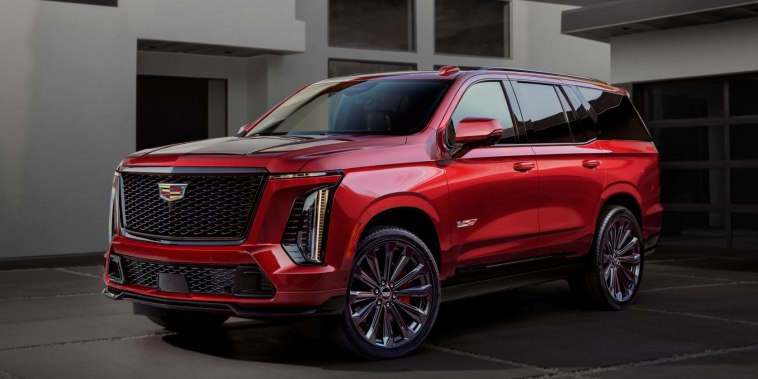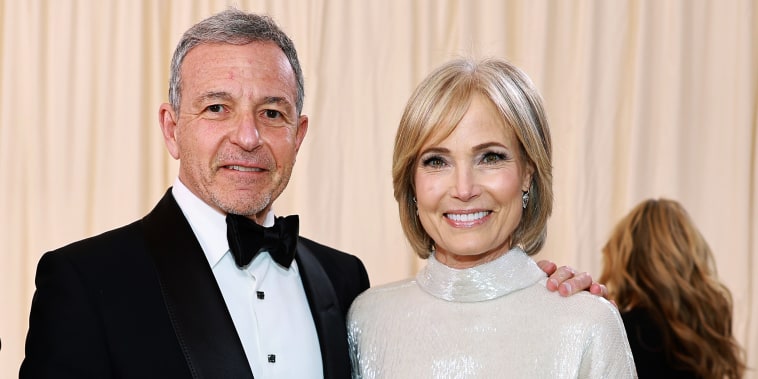MILWAUKEE — Donald Trump’s running mate, Sen. J.D. Vance of Ohio, recounted his hardscrabble Ohio upbringing and his post-Sept. 11 military service as he introduced himself and his young family to the nation at the Republican National Convention here Wednesday night.
Unfurling the tale of a boy who grew up in poverty in southwest Ohio with an absent father and a drug-addicted mother — a boy who is now a 39-year-old man nominated to become the next vice president — Vance offered an up-from-the-bootstraps story that the Trump-Vance ticket hopes will resonate with working-class and rural America.
Vance spoke of being raised in Middletown, Ohio, midway between Cincinnati and Dayton — “a small town where people spoke their minds, built with their hands, and loved their God, their family, their community and their country with their whole hearts” — but also a town “cast aside” by the ruling class in Washington.
There, while his own mother struggled with addiction, Vance said he was raised by “Mamaw” — “the name we hillbillies gave to our grandmothers” — who he described as “an old woman who could barely walk but she was tough as nails.” The account was familiar to readers of Vance’s 2016 best-selling memoir, “Hillbilly Elegy.”
Taking the stage to the twangy strains of Merle Haggard’s “America First,” Vance offered voters a narrative through-line about how the lessons he learned with Mamaw in greater Appalachia shaped his populist and isolationist worldview, from his and Trump’s restrictionist trade policies and skepticism of overseas entanglements to their shared hard-line immigration stance and concerns about the scourge of fentanyl in communities across America.
“President Trump represents America’s last best hope to restore what — if lost — may never be found again,” Vance said, saying he and Trump were fighting for people like “the autoworker in Michigan, wondering why out-of-touch politicians are destroying their jobs” and “the factory worker in Wisconsin who makes things with their hands and is proud of American craftsmanship.”
“And our movement is about single moms like mine, who struggled with money and addiction but never gave up,” Vance said, gesturing to his mom who raised both hands to her lips before holding them back out to her son.
“And I am proud to say that tonight my mom is here, 10 years clean and sober,” Vance said in an emotional moment that prompted a standing ovation. “I love you, Mom.”
“J.D.’s mom! J.D.’s mom! J.D.’s mom!” the crowd chanted.
Vance was introduced by his wife, Usha Vance, who was met with a polite but somewhat subdued response, including audible gasps when she described how her husband, a “meat and potatoes” guy, came to embrace her vegetarianism.
President Biden, meanwhile, tested positive for the coronavirus following a campaign event in Las Vegas and planned to return to his home in Rehoboth Beach, Del., to self-isolate, a White House spokesperson said in a statement.
On a night when the theme was “Make America Strong Once Again,” Vance headlined the convention along with several other hard-right firebrands, including Rep. Matt Gaetz (R-Fla.), former acting national intelligence director Ric Grenell, former Trump trade adviser Peter Navarro and Trump’s oldest son, Donald Trump Jr.
Extolling Trump’s bearded No. 2 pick Wednesday, Gaetz said that “J.D. looks like a young Abraham Lincoln” but noted that, like former president Ulysses S. Grant, Vance also hails from Ohio “and like General Grant, J.D. Vance knows how to fight.”
“So they can run Biden from the nursing home,” Gaetz said, finishing his speech and building to his crescendo: “We are on a mission to rescue and save this country. And we ride or die with Donald John Trump to the end.”
Trump Jr. and his cadre of loyalists were instrumental in pushing Vance as Trump’s No. 2, a decision that the former president did not finalize until the final 24 hours before the announcement Monday. Navarro, meanwhile, traveled to Wisconsin on Wednesday from Florida, where he was released from federal prison in Miami after serving a four-month sentence for ignoring a congressional subpoena.
Taking the stage, Navarro immediately referred to his prison time, faulting “Joe Biden and his Department of Injustice,” before recounting a favored Trump message: that the former president is merely a martyr, fighting against nefarious forces on behalf of his flock.
“If they can come for me, and if they can come for Donald Trump, be careful,” Navarro said. “They will come for you.”
Parts of the evening, especially those focused on undocumented immigrants — who Trump Jr.’s fiancé, Kimberly Guilfoyle, described as “violent criminal aliens” — were laced with dark imagery.
Thomas Homan, the former acting director of Immigration and Customs Enforcement, accused Biden and Vice President Harris of unraveling Trump’s hard-line immigration policies.
“Biden is the first president in American history to come into office and unsecure a border. Who the hell does that?” Homan said, later adding that Biden and Harris were making a deliberate choice that he described as “national suicide.”
Arizona ranchers Jim and Sue Chilton took the stage moments later, with Jim Chilton offering his “beautiful wife” a kiss on the side of her head. But he quickly turned ominous as well, alleging that since Biden has been president, the hidden cameras on their ranch have recorded more than 3,500 “drug packers” and other undocumented immigrants crossing through their stead.
“These are not asylum seekers,” he said. “It looks like and it feels like an invasion, because it is.”
Illegal crossings at the southern border have soared to record highs under Biden, though in recent months, his administration has launched a broad crackdown that has pushed the numbers back down to Trump-era levels. The Trump administration also faced spikes and record numbers of families crossing the border in 2019. Trump also helped kill a $118 billion border security bill spearheaded by Democrats because he said he didn’t want Biden to have an election-year policy win.
The heated rhetoric onstage could also be found offstage as well, at least in moments. A group of Republican senators followed Kimberly Cheatle, the director of the Secret Service, through the Fiserv Forum on Wednesday evening, shouting questions at her about the assassination attempt against Trump.
“This was an assassination attempt!” yelled Sen. Marsha Blackburn (Tenn.), who was accompanied by Sen. John Barrasso (Wyo.). “You owe the people answers! You owe President Trump answers!”
The confrontation lasted at least 30 seconds, according to onlookers, as the senators chased her and she moved away from them without speaking.
In another one of the evening’s most emotional moments, several Gold Star family members spoke movingly of the family members they lost in combat, blaming Biden for the “disastrous withdrawal from Afghanistan” in 2021 and accusing him of not sufficiently remembering their loved ones.
One couple, Herman and Alicia Lopez, spoke of their 22-year-old son, Cpl. Hunter Lopez, who died during the Afghanistan withdrawal. Biden, they said, met the plane carrying the 13 U.S. service members killed in a single day when an explosion went off during the chaotic withdrawal but turned the focus to his late son, Beau, who died of cancer.
“Worse than that, he has never said their names out loud,” Herman Lopez continued, before reading the names of the 13 service members who died that day in August.
The tableau offered a marked departure from eight years ago, when Trump in 2016 found himself feuding with Gold Star parents Khizr and Ghazala Khan, who spoke on the final day of the Democratic convention. And Trump has not been without his own controversies involving the military; the Atlantic magazine reported that the former president described Americans who have died in war as “suckers” and “losers.”
“President Biden cares deeply about our service members, their families, and the immense sacrifices they have made,” National Security spokeswoman Adrienne Watson said in a statement. “That’s why the president attended the dignified transfer of the 13 brave service members who lost their lives in Afghanistan on Aug. 26, 2021; as well as, of the three who lost their lives in Jordan earlier this year. As he said then and continues to believe now: Our country owes them a great deal of gratitude and a debt that we can never repay, and we will continue to honor their ultimate sacrifice.”
In many ways, Vance is the most ideologically and stylistically similar to Trump of the three men ultimately considered for vice president, and it is unclear whether he will help Trump dramatically expand the electoral map.
He could, however, arguably help the former president fortify his support in Pennsylvania, one of the three “Blue Wall” states — which includes Michigan and Wisconsin — that Democrats now largely believe are Biden’s only path to keeping the White House.
In 2020, Biden lost White men by between 17 and 23 percentage points, according to national exit polls and comparable surveys. But the Trump campaign is still working to increase Trump’s support among this demographic; in a July Washington Post-ABC News-Ipsos poll, 54 percent of White men supported Trump to 38 percent for Biden, a 16-point margin.
Trump aides hope Vance could help shore up support from White men, and are expected to deploy him across the country in working-class and rural areas similar to where he grew up.
Marc Short, the chief of staff to former vice president Mike Pence, said Trump’s choice of Vance as his No. 2 reflects the former president’s confidence in the electoral map.
“There’s no added math there — it’s more of a mini-me,” Short said. “But I also think the selection of Vance clearly shows the party has fully embraced the populist approach now.”
Vance was not always a Trump supporter. In 2016, he described Trump as either a “cynical asshole” or “America’s Hitler” in a text message to a former law school classmate, and in an essay for the Atlantic magazine the same year, he called Trump “cultural heroin.” In an updated 2018 version of his memoir, he revealed that he did not vote for Trump in 2016, instead opting for a third-party candidate.
But he has said he voted for Trump in 2020, and as he sought the Senate seat, Vance quickly modulated his public and private comments about Trump, seeking out his oldest son as an ally and becoming one of the former president’s staunchest defenders.
Keynoting the Republican convention Wednesday night, Vance made clear he knew who had selected him — and to whom he owed his fealty. He began his remarks focused on Trump, describing him as a man who “chose to endure abuse, slander, and persecution” while running for return to the White House, all “because he loves this country.”
Vance reminded the crowd of the “would-be assassin coming a quarter of an inch from taking his life,” stressing that just two days later, “Trump flew to Milwaukee and got back to work.”
“Our once and future president of the United States of America,” Vance extolled, before only then turning to his personal story.
Leigh Ann Caldwell, Josh Dawsey and Maeve Reston in Milwaukee contributed to this report.
This post appeared first on The Washington Post










